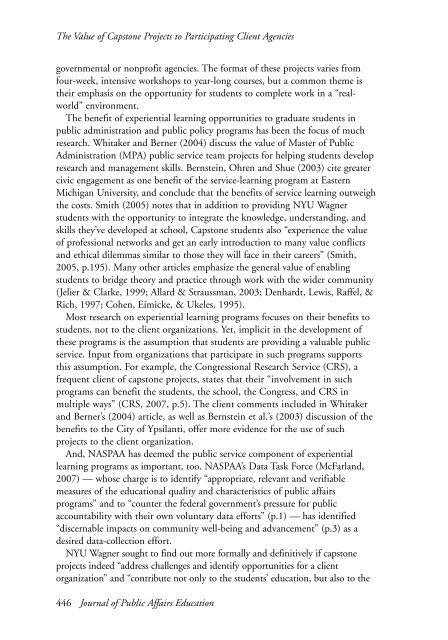JOURNAL OF PUBLIC AFFAIRS EDUCATION - National ...
JOURNAL OF PUBLIC AFFAIRS EDUCATION - National ...
JOURNAL OF PUBLIC AFFAIRS EDUCATION - National ...
You also want an ePaper? Increase the reach of your titles
YUMPU automatically turns print PDFs into web optimized ePapers that Google loves.
The Value of Capstone Projects to Participating Client Agencies<br />
governmental or nonprofit agencies. The format of these projects varies from<br />
four-week, intensive workshops to year-long courses, but a common theme is<br />
their emphasis on the opportunity for students to complete work in a “realworld”<br />
environment.<br />
The benefit of experiential learning opportunities to graduate students in<br />
public administration and public policy programs has been the focus of much<br />
research. Whitaker and Berner (2004) discuss the value of Master of Public<br />
Administration (MPA) public service team projects for helping students develop<br />
research and management skills. Bernstein, Ohren and Shue (2003) cite greater<br />
civic engagement as one benefit of the service-learning program at Eastern<br />
Michigan University, and conclude that the benefits of service learning outweigh<br />
the costs. Smith (2005) notes that in addition to providing NYU Wagner<br />
students with the opportunity to integrate the knowledge, understanding, and<br />
skills they’ve developed at school, Capstone students also “experience the value<br />
of professional networks and get an early introduction to many value conflicts<br />
and ethical dilemmas similar to those they will face in their careers” (Smith,<br />
2005, p.195). Many other articles emphasize the general value of enabling<br />
students to bridge theory and practice through work with the wider community<br />
(Jelier & Clarke, 1999; Allard & Straussman, 2003; Denhardt, Lewis, Raffel, &<br />
Rich, 1997; Cohen, Eimicke, & Ukeles, 1995).<br />
Most research on experiential learning programs focuses on their benefits to<br />
students, not to the client organizations. Yet, implicit in the development of<br />
these programs is the assumption that students are providing a valuable public<br />
service. Input from organizations that participate in such programs supports<br />
this assumption. For example, the Congressional Research Service (CRS), a<br />
frequent client of capstone projects, states that their “involvement in such<br />
programs can benefit the students, the school, the Congress, and CRS in<br />
multiple ways” (CRS, 2007, p.5). The client comments included in Whitaker<br />
and Berner’s (2004) article, as well as Bernstein et al.’s (2003) discussion of the<br />
benefits to the City of Ypsilanti, offer more evidence for the use of such<br />
projects to the client organization.<br />
And, NASPAA has deemed the public service component of experiential<br />
learning programs as important, too. NASPAA’s Data Task Force (McFarland,<br />
2007) — whose charge is to identify “appropriate, relevant and verifiable<br />
measures of the educational quality and characteristics of public affairs<br />
programs” and to “counter the federal government’s pressure for public<br />
accountability with their own voluntary data efforts” (p.1) — has identified<br />
“discernable impacts on community well-being and advancement” (p.3) as a<br />
desired data-collection effort.<br />
NYU Wagner sought to find out more formally and definitively if capstone<br />
projects indeed “address challenges and identify opportunities for a client<br />
organization” and “contribute not only to the students’ education, but also to the<br />
446 Journal of Public Affairs Education

















